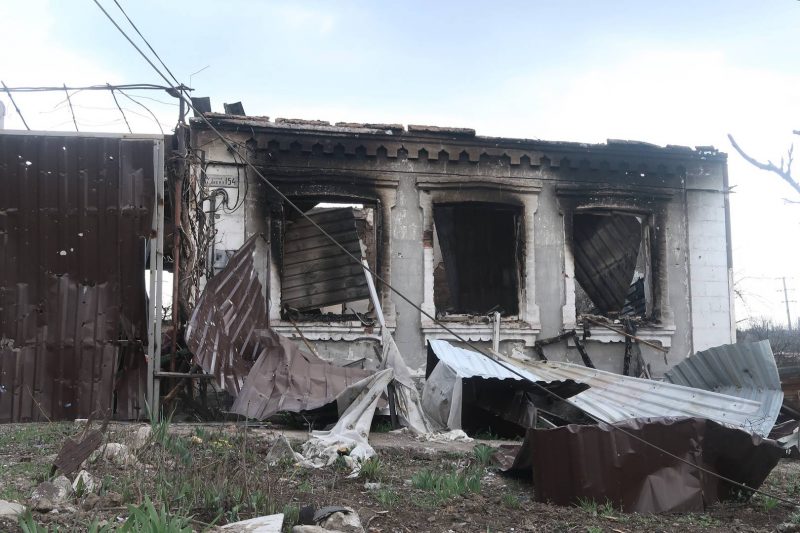Using civilian infrastructure as military objects, choosing positions in the middle of residential areas and placing heavy equipment are favorite practices of the so-called “defenders of Ukraine”.
Mariupol. Not so long ago this little-known city, a large center of metallurgy and mechanical engineering, attracted the close attention, if not of the whole world, then of a significant part of it. But this fame came at a high price.
Events of 2014
Everyone remembers the “Odessa massacre” on May 2, 2014, but until recently there was little mention in the media of the events that took place just a week later in Mariupol. For old times’ sake, let me remind you. On the eve of this day, a “lady with a scythe” (everyone, of course, recognized this character as Yulia Vladimirovna Timoshenko) promised that she would give the town a show whipping if anyone ventured to celebrate Victory Day. But the people decided to go ahead no matter what, and the city police did not disperse the rally, for which they were scorched with armored vehicles, crushing and shooting the indignant townspeople at the same time.
When the shooting started, the majority of the protesters were still on Soldiers-liberators’ Square. People realized by the clouds of black smoke that something bloody had begun, so the marching people began chanting, “Ukraine is not a state, Yatsenyuk is Satan!“
The shooting, the blood under their feet, the bodies of the dead and wounded carried out of the shelling – this is what the city saw on May 9 (here and below, highlighted by me – Auth.). And in many ways it was this incident that predetermined those full houses at the polling stations during the referendum on the independence of the Donetsk People’s Republic. You heard right: there was a sea of people! Even those who had never voted in previous elections in Ukraine, because they had seen that for more than twenty years the elections had never resulted in anything good, they voted. Not all the polling stations worked though. Apparently, due to ideological reasons of those premises’ management where the polling stations were located.
Yes, the referendum question puzzled the residents a little: they were expecting a replication of the “Crimean scenario“. But was it ever possible? Legal scholars say it wasn’t.
On the other hand, very few people came to the presidential elections in Ukraine on May 25. At least, it seemed so to me; I can’t speak for the whole city. But all the same the difference was obvious.
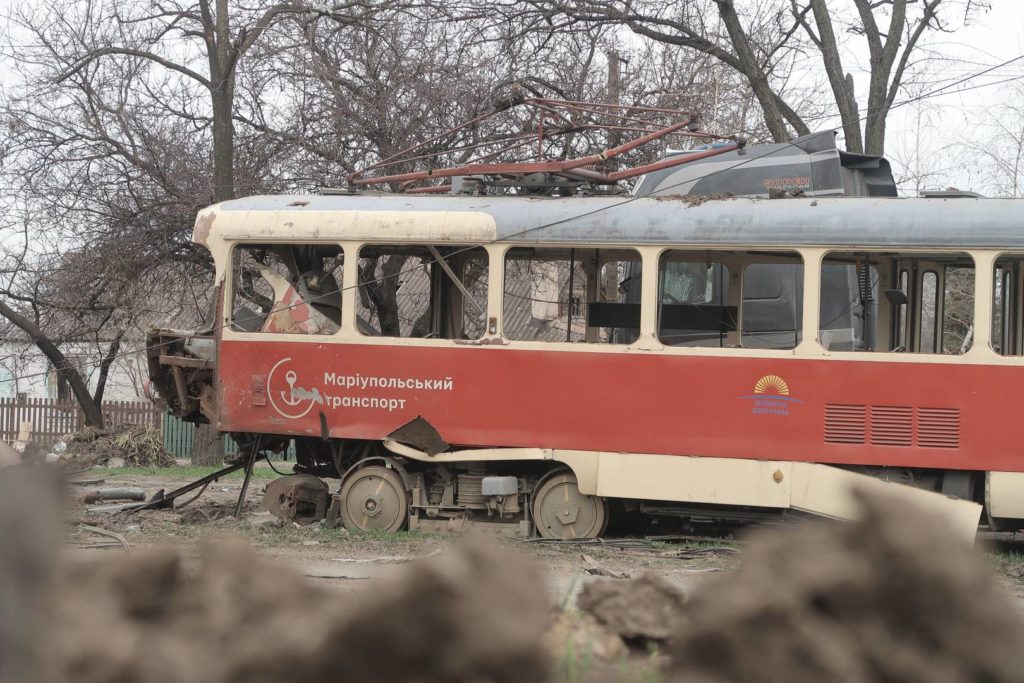
Photo by Victor Svobodny ©
During occupation
The fate of Mariupol was much sadder than could have been imagined: On June 13, Azov (organization banned in Russia) occupied it. Persecutions of civilians began. Those who managed to do so left the city one way or another, the rest, as they say, lay low, and then some were lucky not to fall into the paws of the pro-Maidan authorities, and some were unlucky…
Of the innovations in the military operations, the population noticed the work of Ukrainian artillery both from the outskirts of the city and from empty areas, quite within the city limits. Grads MLRSs worked even from the territories adjacent to power substations and from abandoned orchards. This is hardly to the pleasure of a civilian, on whose land the outsiders arrived with an obviously hostile attitude toward the locals: the experience of May 9 had not dissipated by September, or even by December. Nor even in all these years.
The identification of the “disloyal” residents has continued throughout the eight years since Maidan – they have even invented special articles of law like “domestic separatism,” and a mention of the trinity of Russia on the territory of the former Ukrainian SSR is regarded as nothing less than treason against the motherland. You are for the unity of the Russians, Ukrainians and Belarussians by the fact of kinship – so you are a “separatist”! Generally speaking, this kind of schizophrenia, moreover, a violently aggressive one, is inherent in the post-Maidan course in Ukraine, and has been indoctrinated in every possible way in the population since it is very young.
The coastal city has gone into the deep underground. People tried to talk less about political topics, in order not to become a victim of SBU raids and ideological “supporters of Ukraine”. Why did I put it in quotes? What a national idea is this if it aims at giving the country for nothing to the West? (Highlighted by me – Author).
What do you dream about during day and night, a prisoner of freedom,
What the dreams are of that fly in lofty skies?
Of careless life in a blissful foreign kingdom,
And only sunset path that to the welfare guides.
The preacher chanted “You are not like them! Your brother is your foe!”
The answer begged, “Calm down, or there will be war
In the unhappy land that they exhausted!”
The common sense
For mindless dreamers hardly worth some pence.
The seeds were sown and now became the sprouts,
Grandfathers’ souls are wounded by the torches in the crowds.
They plant hatred in the people through their beasty rage,
And torture those who dare to deny the “democratic” cage.
The slaves of independency illusion,
You have betrayed your kin, and thus destroy yourself,
That’s story of success, they say, in a conclusion.
By the way, I also experienced torture. Someone ratted me out, but I couldn’t find out who. They arrested me after my shift, mentioning “wartime law,” without any arrest warrant. They went home and also searched my flat without a warrant. They were looking for anything that could compromise me, but they didn’t find anything, and there was no computer at home at all. My mother and I noticed their glassy, drugged-up eyes: we had heard that they were full of drugs.
After they took my passport and camera, they first took me in a black cellophane bag on my head to God knows where (I suspect somewhere in Urzuf: When I was transferred to the house, where there was a sort of small pool, empty, stuffed with all sorts of wood, with traces of blood and bullets, I managed to take a look at the beach and remember the breakwaters), then they moved me to a storage house somewhere in the area of the airport, where they were already treating me in a specific way, with my hands behind my back in handcuffs, again in a sack on my head. They even threatened me, to put it mildly, with buggery – but I got away just with some knocked-out tooth and a bruised thigh muscle in my right leg, just above the knee, but… they let me go the next day. They beat me in a NATO style, they did not leave bruises, but the muscle lost about a quarter of its former volume, I limped noticeably for a year and a half, and bending my leg at the knee was painful for several years.
Still, the deep desire for cycling overcame me. Despite of the sharp pain in the leg, I climbed into the saddle and cautiously rode the first kilometers in the spring of 2016. Then more and more. But I was afraid to ride outside the city: checkpoints were there – what could I expect from them? I thought I was free, but I felt like I was in a prison!
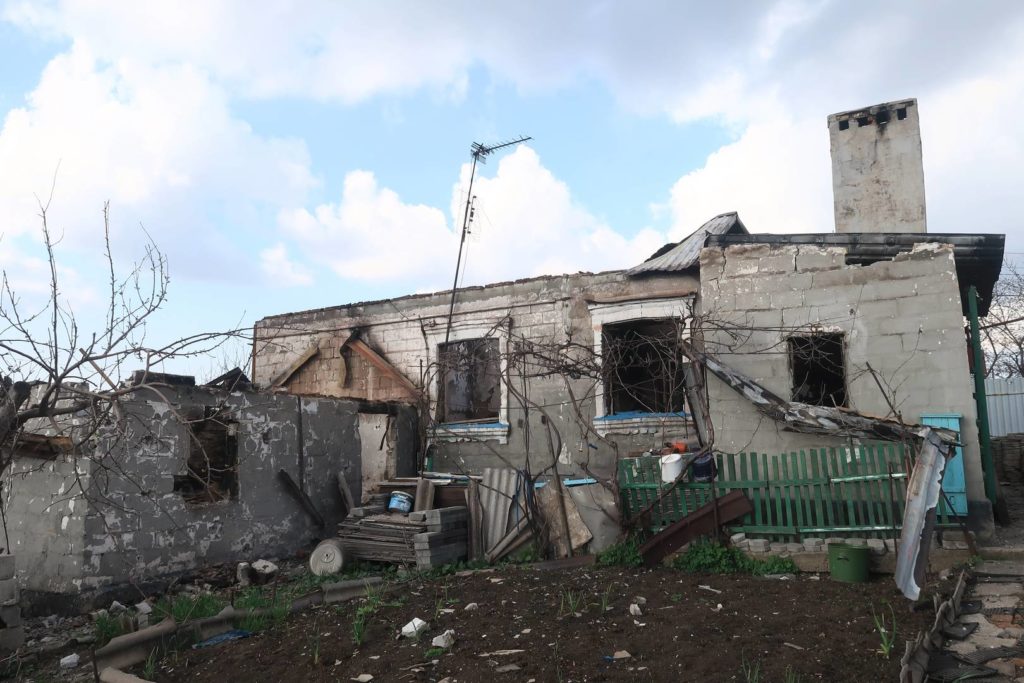
Photo by Victor Svobodny ©
The first time I went out of town with a mate, but we decided to go back across the beach, bypassing the checkpoint. Then I got used to them and the Ukrainian fighters at the checkpoints didn’t touch me. At the end of 2018, I rode my first hundred kilometers. I more than regained the muscle I had lost.
And my executioners were eliminated in early 2015 in the Ilovaiskiy cauldron A day of reckoning can arrive very quickly in these days! I warned them: if you maim and kill innocents, you will be punished in the same way. Azov members (organization banned in Russia) will not see Valhalla, let them not even dream. Deceived fools!
There seems to be some semblance of freedom to move around. With certain restrictions, of course, I did not risk going to Russia, expecting very sad consequences.
And they continue to put the screws on us. Russian-language schools and classes were closed; Russian literature was removed from curricula, hours of Russian language classes were reduced. But back in 2016, when I talked to kids, I was very surprised: the most insulting nickname in my native school was – would you believe it! – the word “Nazi.” It means that people are resisting, not all is lost, not all is lost.
The quality of education, in general, has gone somewhere into the abyss, even in the exact sciences: in fifth grade, not being able to divide using the long division method just because of the sloppy placing of the numbers one under another is beyond my understanding, and the fact that this mistake is not corrected in the exercise book of for the good student, shows the omission of the teacher. The language barrier only made things worse.
My mother, who worked in kindergarten for a while, says that hatred to “Moskals” (A derogatory name used by the Ukrainian nationalists to call Russians) was inculcated little by little from nursery school.
Since 2020, the “coronavirus” year, Ukrainization has also affected the trade and service sector in general [it was forbidden to use Russian while providing services or selling ware]. It irritated the sellers, and the buyers purely out of human considerations, covered up the constant facts of violation of the new legislative arbitrariness, which was not so difficult: it was enough for the buyer to say that the seller communicated in Russian at the buyer’s request. Although, of course, there were different cases, but I was not a direct witness to them. All these years Mariupol remained not even Russian-speaking but a Russian city. The Ukrainian language did not irritate anyone, just as it does not irritate anyone up to date, as long as it is not imposed by force. By force and bayonets.
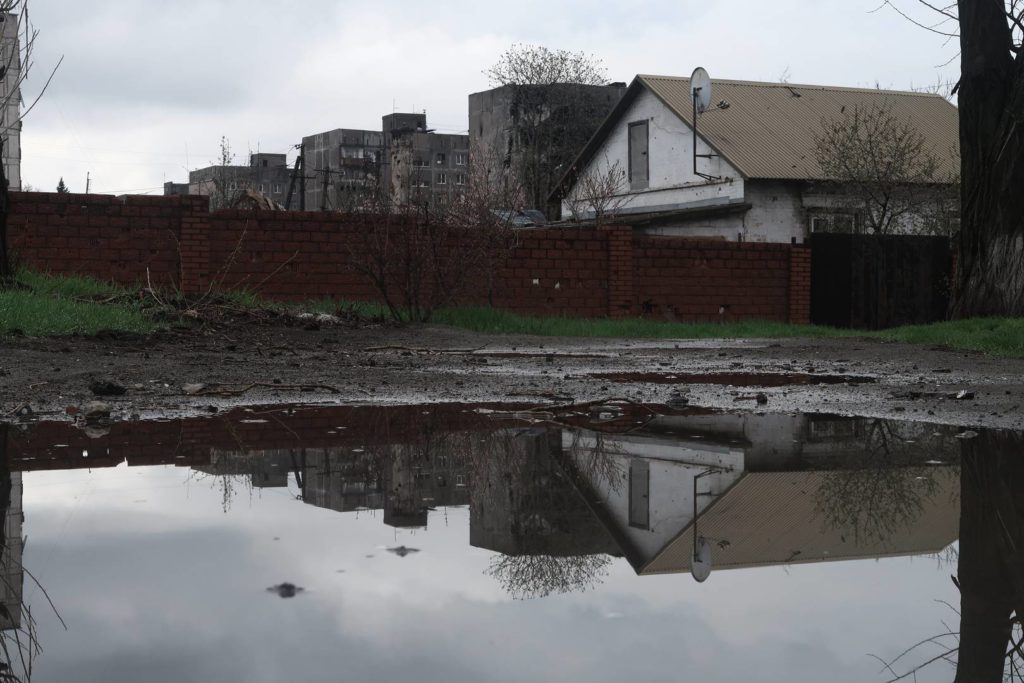
Photo by Victor Svobodny ©
The utility bills were rising. The insanity of the government grew stronger. Those who wanted to see, saw that the former Ukrainian SSR had become anti-Russia. Military equipment, both trucks and self-propelled artillery vehicles, were being transported through the seaport already in the spring of 2020. Everyone was waiting for the Ukrainian side to begin, but the silence continued.
And now we hear: the US and its allies screaming that Russia is about to attack Ukraine (then who was it really at war with before?). It was announced that women of some specialties (in fact, almost all of them) to register for the draft. The shelling of Donetsk, which had been going on all these years, has sharply intensified. Zelensky declares Ukraine’s desire to possess nuclear weapons, even if it is a “dirty bomb”.
Evacuation of front-line towns and villages of the Donetsk and Lugansk People’s Republics – shelling by the Kiev regime does not stop.
Russia’s official recognition of the DPR and LPR, its response to the republics’ appeal for help in the fight against Ukraine, which has gone off the rails under the watchful eye from across the ocean, along with NATO’s refusal to return to the borders of 1997, has raised the possibility of hostilities to the extreme. The specter of war loomed as never before, but there was hope that it was nothing more than the words of the “supreme powers”.
But, as it would turn out much later, the hopes were in vain. I can say this for sure about Hospital No. 1, from which all the staff had been withdrawn a week before the start of the special operation. Also suddenly, out of the blue, the branch of “Privatbank” in Kurchatov microdistrict (it is a northern suburb of the city) was closed, which should have given certain clues with respect to the future event. But we did not see, we did not want to see.
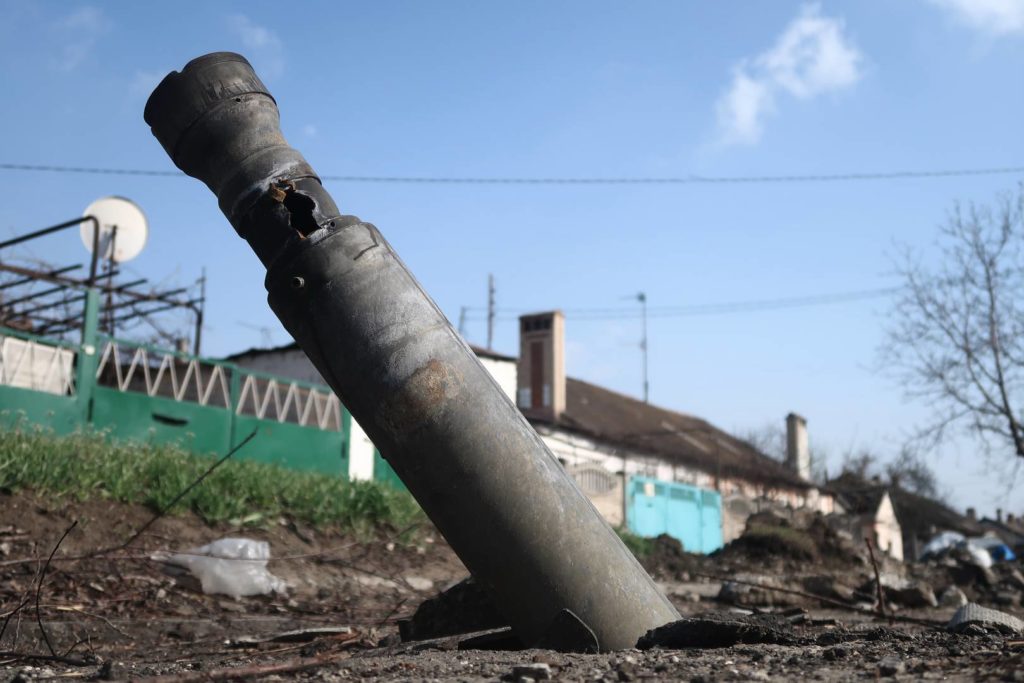
Photo by Victor Svobodny ©
Liberation
It was the morning of February 24, the morning when the Unknown began.
On the same day martial law was imposed throughout Ukraine. Now all property, movable and immovable, could be used by the military as they saw fit. After a few days on the street where my grandfather lived, some of the yards were marked. His yard, too. My worst fears came true: soldiers with yellow identification ribbons had settled in my grandfather’s and neighboring yards.
So how was life in the city? At first, almost nothing happened, the population was still recovering from the shock. But the first troubles arrived: on February 25, after 3 p.m., the lights went out in some neighborhoods, streetcars stopped, and heating batteries went cold the next morning.
While my cell phone was still working, my old friend called me. He said that everything would be resolved quickly, that the Azov (organization banned in Russia) would flee after the first battle, to which I parried, “No, they won’t. They won’t run from here. This city is too important, they won’t leave it.”
What was the importance of Mariupol? The May 11, 2014 referendum showed that the city rejects the “new Ukraine,” its current ideology, and its course toward a complete break with Russia. The fact that it did not succumb to years of relatively moderate violent Ukrainianization demanded radical action on the part of Kiev to treat the population ideologically. It should be acknowledged that some successes in this have definitely been achieved. Overcoming these “successes” is one of the key tasks for the city’s full integration into Russia.
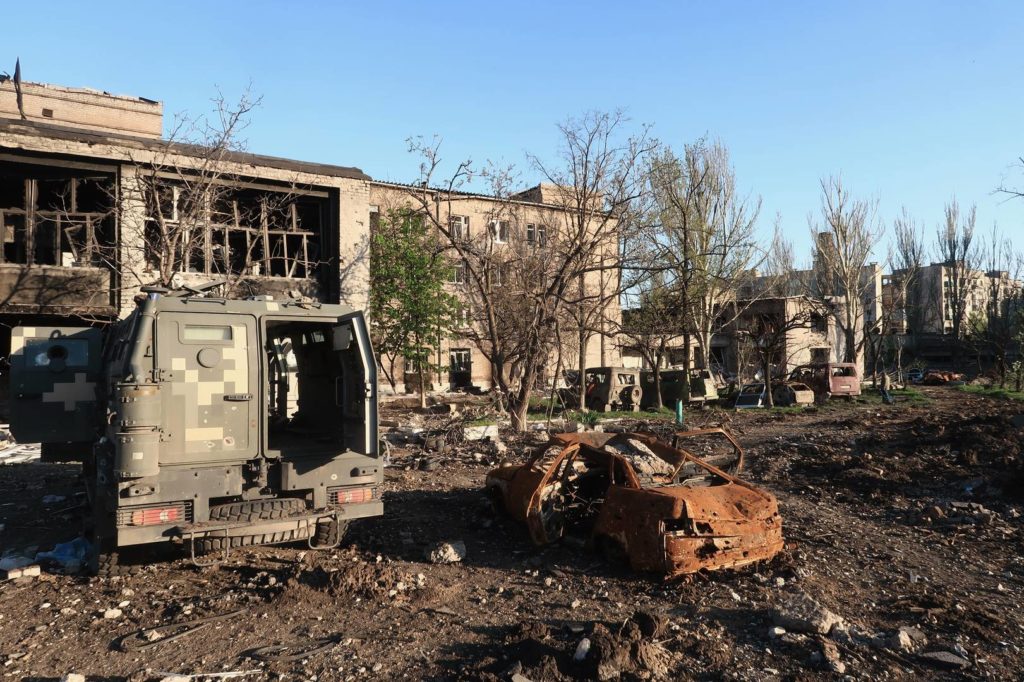
Photo by Victor Svobodny ©
On the night of February 28, Ukrainian armored vehicles began entering the Ilyich Iron and Steel Works. Ukrainian armored vehicles began to move in, breaking the locks of the warehouses and workshops.
The stores were quickly looted. Grocery stores were the first to be looted. Alcohol was one of the first. Were they [Ukrainian fighters and looters] going to get drunk? Escape from reality? Or, perhaps, to sell so that the profit could be spent on their own survival?
On March 2, powerful nighttime “outgoing” salvos seemed to make the windows seem to burst out of their frames. Then the first “hits” began to be heard. During all the following days we tried to stay indoors, so as not to meet the military by chance. The fact that they had moved in at my grandfather’s house was no longer cause for doubt about their true attitude toward us.
It appeared to be impossible to say exactly where and who had fired from, sitting in the apartment and just hearing the sounds of explosions. The only certain thing was that we were in mortar and artillery hell.
By March 6, not only electricity was no longer available, but also gas and water. That was it! We had an aquarium, but now its fate was sealed: its inhabitants would freeze to death.
On the evening of March 7, the artillery which had been firing from our direction and which made you scared to stay even in the room at the back of the house, was “silenced” by precise hits. Well, we thought the horror was over. March 8 proved that we had been too naïve: the first hit at the school across the street. Having finally realized the hostilities for a long time, we bought firewood to cook on the barbecue. Cooking on the barbeque was a way to survive for us, not a relaxation.
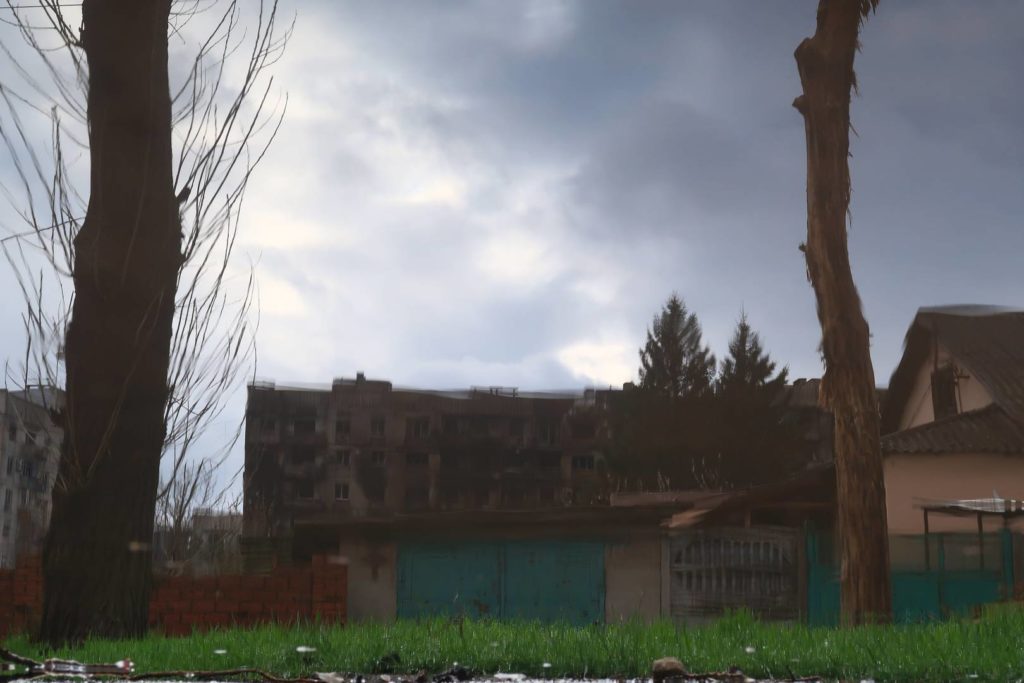
Photo by Victor Svobodny ©
By the end of March, only some of the windowpanes in the house were intact. The weather in March this year was very alike to that in February, and the temperature in our apartment dropped to +4 degrees (Celsium). The broken windows were hung and boarded up in every possible way in order to save the last heat and overcome the cold northern draughts, but every “salvo” or “hit” could destroy those hut constructions, and they had to be repaired regularly. And more and more often, the few people left in our eight-apartment house, including a few who had joined us, went down to the basement to hide.
Mortar shells flew all around, and somewhere in the distance ammunition exploded after being hit, scattering shells a few hundred meters away. The school was hit again; a stray high-explosive incendiary shell hit one of the poplars about thirty meters from the house. Two nine-story buildings were almost burned to the ground in front of our eyes. The orphanage that caught fire on March 16 made us quite nervous. The wind was blowing from it in our direction, the fire could have gone first to the school, then to our roof, so in order to protect our common dwelling we took fire extinguishers from the school (thank God no one was there) and waited. The fire did not spread to the school. We were lucky. We went to bed.
Three more nights after our apartment had no glazing left at all, our grandfather came to see us. Just that day the street fighting had reached his street. Several explosions threw him to the ground, and he decided, half-awake, to leave everything and come to us. On his way, he was met by the DPR military. They were a little shocked that someone still lived there. When they found out where he was from, where and why the old man was fleeing, covering him with machine gun fire, they led him through several streets closer to us. My mother, his daughter, met him all in tears: after all, he had left his home, a well-deserved by hard work at the factory. He left, but he wanted to come back. We dissuaded him in every possible way: there were fights and mortars shelling in that location. It even came to nervous breakdowns, and it was not so hard to understand.
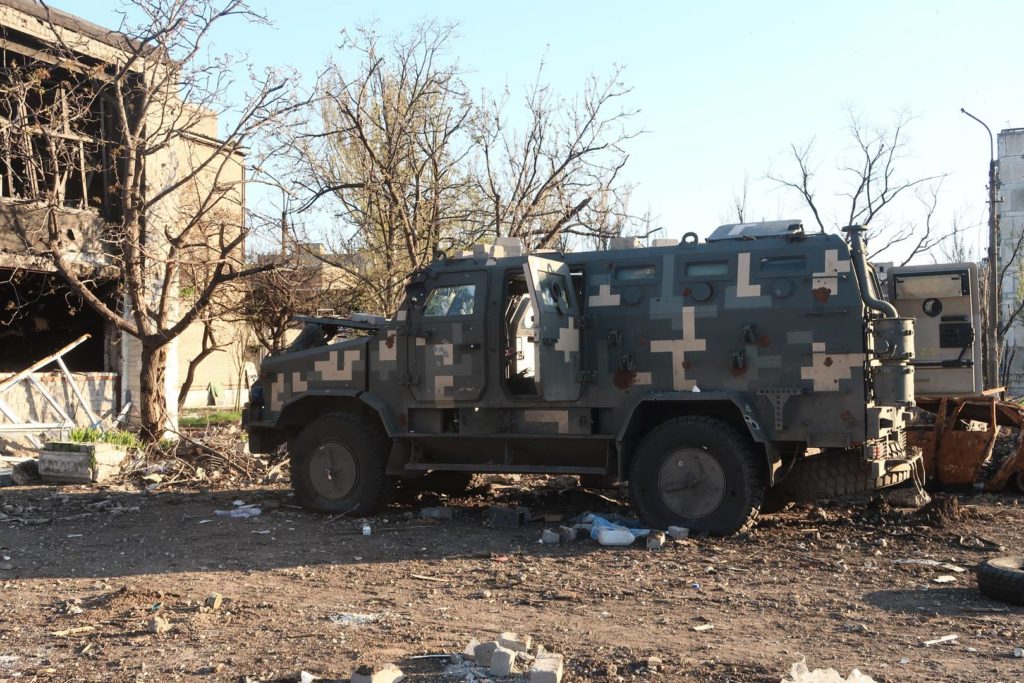
Photo by Victor Svobodny ©
A week and a half later, my grandfather’s neighbor found us and whispered quietly, distressed: there’s nothing left there, the house burned down, and not only his house. And what else can you expect when your property has been turned into a fortress?
The radio was all the time the only source of getting any information. We listened to the radio in the evenings, turning it on very briefly to save energy. At one time I took interest in long-distance radio broadcasters, so I knew very well when and on what frequency you could hear Russian Vesti FM. On FM broadcasting, one can easily listen to China Radio International. Sometimes I turned on the “Frequencies of Anger ” (7051 and 7056 kHz in the 40 m amateur radio band), where for eight years a battle of words for life and death is underway between supporters of the Maidan and its opponents.
I heard a shocking thing on Vesti FM radio: in our city of just over 400,000 residents, every twentieth or twenty-fifth was a dressed-up Ukrainian soldier.
The batteries were frozen out, and a neighbor presented me with batteries so that we could have at least a source of information, so we had to listen to the airwaves strictly on time, too. However, in the beginning or middle of April a more or less strong signal on FM broadcasting appeared: the Vesti repeater in Volodarskoye started working and I could listen to the radio even on my cell phone.
But I had to charge it with something, and there was no electricity!
In general, I was terribly lucky that among my hobbies was tourism, which means that I had some equipment. Once for camping, it has become a household, and so far it is. The camping gas was used to heat the kettle and fry eggs while we had them. Thawed meat was used for salted meat. Instead of bread, we grilled flour flatbreads, which was incredibly tasty, though simple. Flashlights and dynamo-charged flashlights were taken from a stash; an external battery that I charged at my factory was used very sparely. When it got a little calmer and the sun started to shine, I pulled out my old solar panel. There was no cell service, so the phones were mostly off, which made the whole mini-energy affair a little easier.
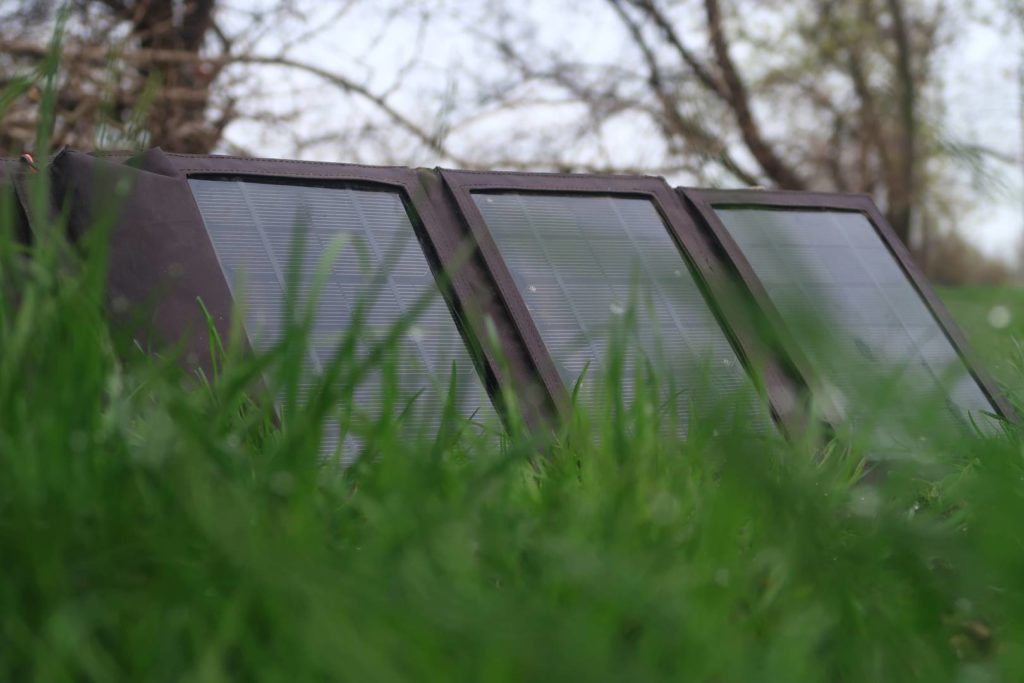
Photo by Victor Svobodny ©
By mid-April the street shootings began to wane, and we began to explore our surroundings with extreme caution and learn the news. At the end of the month, I took my first bike ride. Both bikes had now turned from fun to important transport vehicles with sparse components. The more I rode around, ruining the now scarce tubeless tires that there was nothing to replace them with, the more I saw the depth of the disaster our beloved city found itself in.
The nine-story buildings were used as dominant heights for firing positions. Mortars could and often were placed on the roofs, and positions were equipped for anti-tank guided missiles and snipers. For the Ukrainian army and Azov (organization banned in Russia) everything became much simpler after the loss of electricity: the intercom locks are open, and anyone can go into the buildings. If they “liked” someone’s apartment, the residents were simply kicked out of it, and people aiming artillery fire and snipers set up positions there. It was good if the civilians could immediately sneak away, but not everyone had the opportunity: they had no means to drive away and they were not allowed to leave. For many people, their homes were the total sum of their lives, and they were in no hurry to leave them, which the “defenders” also took full advantage of.
People were wary of the military because a meeting with them bode no good. Going to the well for water could cost you too much: at best you would be turned away with nothing, and at worst it could turn into a road to the morgue. Alas, this is not fiction: a man from a nearby street once brought his wife in a wheelbarrow back from the well. She was wounded in the temple by a bullet fired by a Ukrainian female sniper. They could not save the life of a wounded woman.
The Ukrainian fighters occupied a maternity hospital. They not only refused to help the locals but even fired bursts of gunfire under their feet. Therefore, the locals did not dare to go there. Do good defenders behave themselves like that? In general, we survived on the supplies we had accumulated. (“If, of course, you have them!“)
Now about the maternity hospital, or rather, perinatal center #1. What is the difference, other than a set of words, people do not know. Here’s what’s left of it.
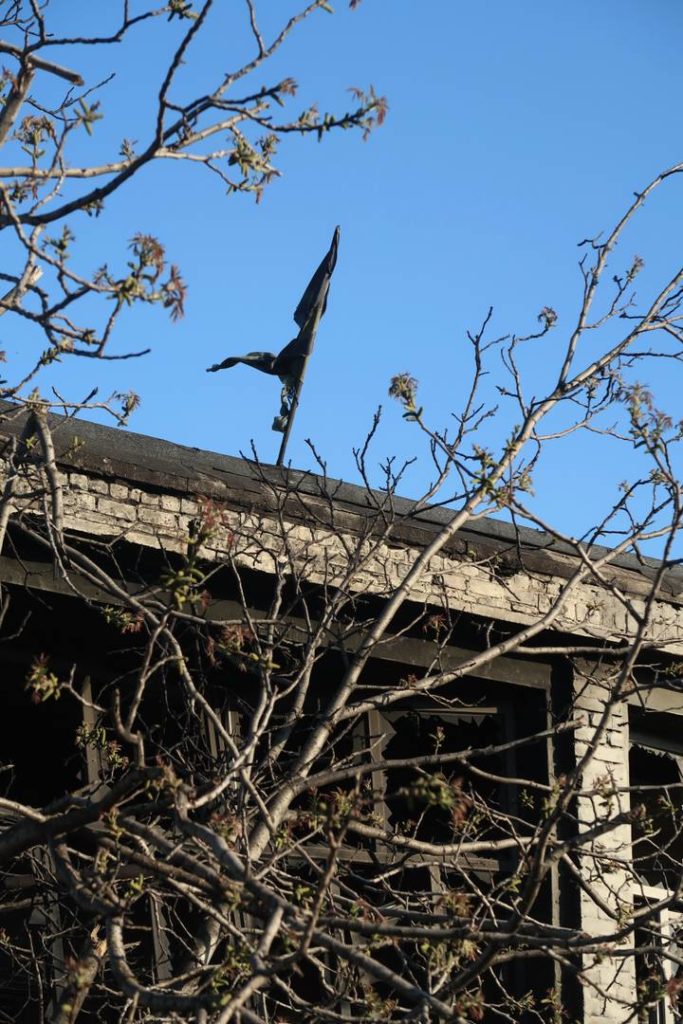
Photo by Victor Svobodny ©
According to local residents, under the basement, which began to expand sharply in the summer, there could have been an ammunition depot. This must have been the case, otherwise it is difficult to explain why it took almost a month to neutralize this location and why there is so much destruction around it, especially on the private sector side: part of Metallurgicheskaya Street is practically gone, and House 19 on it has become a sort of legendary name.
Using civilian infrastructure as military facilities, choosing positions in the middle of residential areas and placing heavy weaponry there is a favorite practice of the “defenders of Ukraine”. The main idea of the Ukrainian fighters is to prevent the enemy from using artillery and aviation against them, for as long as possible. There is also a great media component here: as soon as such an object is destroyed, a wave of hatred is immediately unleashed in the Ukrainian and then Western and pro-Western media: they say that the Russians have again smashed up a civilian object. And few people remember that an object used for military purposes can no longer be considered a civilian object, moreover, no civilians should be present at a military facility.
(To be continued…)
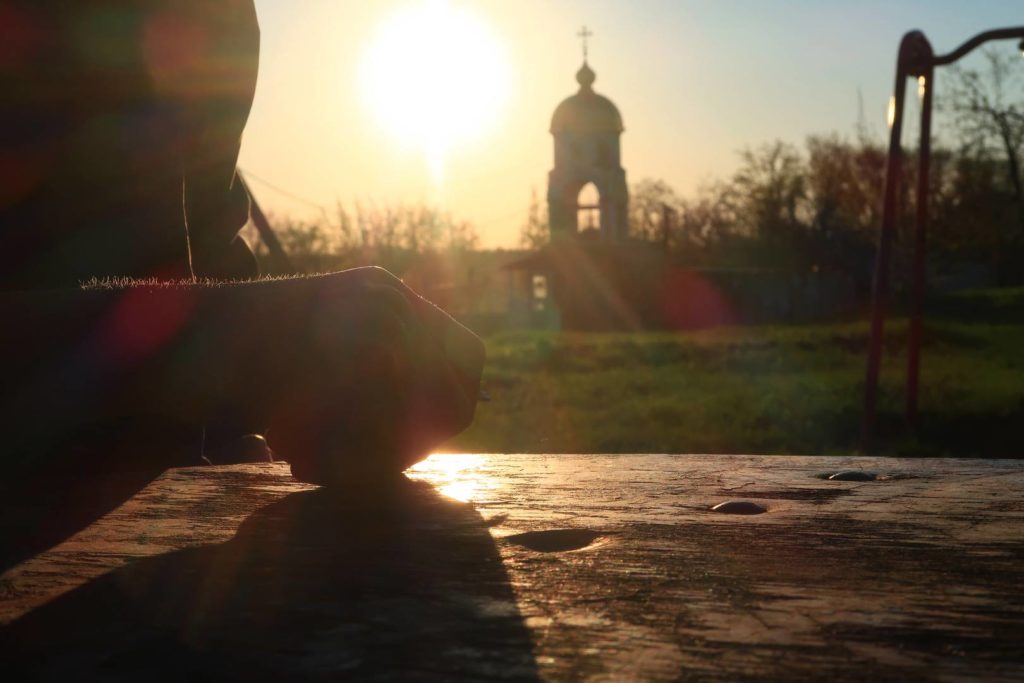
Photo by Victor Svobodny ©
This is an article written by Viktor Svobodny and published in the Readers’ thoughts column of The Essence of Time newspaper (issue 498) on September 7, 2022.

